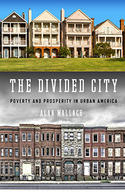To understand how American democracy has worked, and why its future may be limited, it’s critical to look at the issue of property. From early on, the country’s republican institutions have rested on the notion of dispersed ownership of land — a striking departure from the realities of feudal Europe, east Asia or the Middle East. read more »
Middle Class
Transit Planners Want to Make Your Life Worse
In our system of government, the public sector is, well, supposed to serve the public. But increasingly the bureaucracies at the state and local level increasingly seek to tell the public how to live, even if the result is to make life worse.
This became glaringly obvious recently, when the CEO of the Los Angeles County Metropolitan Transportation Authority, Phil Washington, reeling from data showing a steady drop of transit riders, decided that the only solution was to make driving worse. read more »
- Login to post comments
The Real Conflict Is Not Racial or Sexual, It's Between The Ascendant Rich Elites and The Rest Of Us
Despite the media’s obsession on gender, race and sexual orientation, the real and determining divide in America and other advanced countries lies in the growing conflict between the ascendant upper class and the vast, and increasingly embattled, middle and working classes. We’ve seen this fight before. The current conflict fundamentally reprises the end of the French feudal era, where the Third Estate, made up of the commoners, challenged the hegemony of the First Estate and Second, made up of the church and aristocracy. read more »
- Login to post comments
The American Working Class Dilemma
For the past 125 years, Labor Day has been a time to celebrate the relevance, and political power, of the American working class. As recently as the 1990s, organized labor’s big day was an important milestone on the political calendar, particularly for Democrats. read more »
- Login to post comments
A Review of Alan Mallach's The Divided City
The astounding revival of American cities is real. However, the inequality evident in virtually all of them is real as well, and built into the system. Much of the urban discourse has centered on the former, but the latter has likely has a broader impact on contemporary metropolitan development nationwide. Inequality in American cities has three dimensions – spatial, economic and racial. The erosion of the middle class is a key feature of industrial city decline and most impacts older industrial cities. And of course, sweeping global and national trends are at work. read more »
- Login to post comments
Will The Democrats End Up Saving The California Republican Party?
Left to its own devices, California’s Republican Party would be ready to be embalmed for display at the Museum of Natural History. But there’s one last hope for the state GOP: the growing lunacy among Democrats.
Many positions now taken for granted by Democrats should threaten their hold on the bulk of California’s middle- and working-class voters. read more »
- Login to post comments
LSE Economist Paul Cheshire on Urban Containment and Housing Affordability
Paul Cheshire, Professor Emeritus of Economic Geography at the London School of Economics, has distinguished himself as one of the world’s pre-eminent housing economists. This article discusses his recent interview with Ahir Hites, a senior research officer in the International Monetary Fund (IMF) Research Department, reported in The Unassuming Economist Global Housing Watch Newslettter. read more »
- Login to post comments
In Defense of Houses
A critical component in the rise of market-oriented democracy in the modern era has been the dispersion of property ownership among middle-income households—not just in the United States but also in countries like Holland, Canada, and Australia, where it was closely linked with greater civil and economic freedom. In its early days, this dispersion was largely rural, but after the Second World War, it took on a largely suburban emphasis in the U.S., including within the extended metro regions of traditional cities like New York and Los Angeles. read more »
- Login to post comments
The Great Conservative Suicide Pact
Republicans have been celebrating their good fortune as Democrats vying for the presidential nomination propose free medical care for undocumented people and the elimination of private health insurance, and open borders, not to mention reparations for slavery and the near-term elimination of fossil fuels. Add it up, and it may be enough to keep Doctor Demento in the White House for four more years. read more »
- Login to post comments
What Do the Oligarchs Have in Mind for Us?
There seems to be no good reason why a thoroughly scientific
dictatorship should ever be overthrown.
~Aldous Huxley, Brave New World Revisited
The recent movement to investigate, and even break up, the current tech oligarchy has gained support on both sides of the Atlantic, and even leapt across the gaping divide in American politics. The immediate concerns relate to such things as the control of key markets by one or two firms, the huge concentration of wealth accruing to the tech elite and, increasingly, the oligarchy’s control over and manipulation of information pipelines. read more »





















